
 Katie Wood
Freediver, Writer, Explorer
Katie Wood
Freediver, Writer, Explorer

 Katie Wood
Freediver, Writer, Explorer
Katie Wood
Freediver, Writer, Explorer
Determination is a key factor in achieving success in freediving. It is the driving force that propels athletes to overcome obstacles, push their limits, and strive for excellence. Whether you're a coach, freediver, or enthusiast, understanding how to nurture determination is essential for reaching your full potential in this sport. Let's explore the scientific basis of determination in freediving and reveal actionable strategies to supercharge your drive to succeed!
Determination is not just a mental state; it has a neurobiological basis. Neurotransmitters such as dopamine and serotonin play crucial roles in motivation and reward pathways. Scientific studies have shown that the brain releases these neurotransmitters during challenging freediving activities, creating a sense of accomplishment and reinforcing determination. For example, a study published in the journal "Neuropsychologia" (Pessiglione et al., 2007) demonstrated the relationship between dopamine release and motivation in freedivers.
Dopamine, often referred to as the "feel-good" neurotransmitter, is associated with pleasure, reward, and motivation. When freedivers experience success or make progress in their training, their brains release dopamine. This surge in dopamine not only enhances their mood but also reinforces their determination to continue working towards their freediving goals. Therefore, it's crucial to celebrate even small victories in training and competition to trigger these rewarding neurobiological responses.
Psychologists have long been interested in the concept of determination and its role in freediving performance. Self-determination theory, developed by Deci and Ryan in 1985, emphasizes the importance of intrinsic motivation, autonomy, and competence in nurturing determination. Freedivers who find personal meaning in their sport, have control over their training and believe in their abilities are more likely to exhibit unwavering determination (Ryan & Deci, 2017).
Self-determination theory suggests that there are three basic psychological needs that, when fulfilled, promote determination:
Autonomy - Freedivers should feel a sense of autonomy in their freediving pursuits. This means that they have a say in their training, goals, and decision-making processes. Coaches and mentors should work collaboratively with freedivers, involving them in setting objectives and planning their freediving experiences. When freedivers have a sense of ownership over their journey, they are more likely to stay determined.
Competence - Feeling competent in freediving is vital for freedivers' determination. Coaches should provide constructive feedback, encourage skill development, and acknowledge freedivers' progress. When freedivers see themselves improving and gaining competence, it reinforces their determination to continue training and competing.
Relatedness - Building positive relationships within the freediving environment is essential. Freedivers who feel connected to their coaches, fellow freedivers, and support systems are more likely to maintain their determination. Creating a supportive and inclusive freediving community fosters a sense of relatedness, making the journey more enjoyable and motivating.
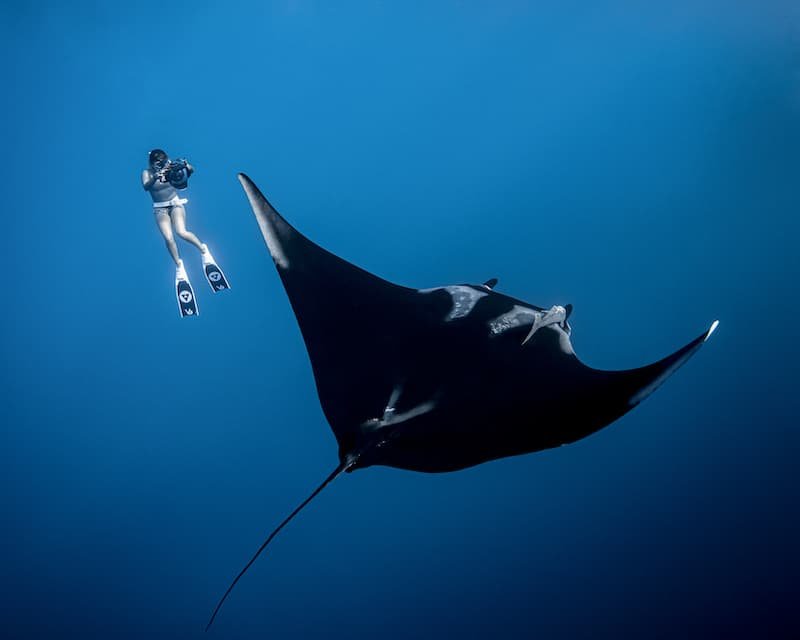
Setting specific, challenging goals is another essential aspect of determination in freediving. Goal-setting theory (Locke & Latham, 1990) suggests that individuals are more determined when they have clear objectives. Scientific research has shown that freedivers who set performance-oriented goals and monitor their progress are more likely to stay committed to their freediving journeys (Zimmerman & Kitsantas, 2007).
Goal setting is a multifaceted process. To enhance determination through goal setting in freediving, consider the following components:
Specificity - Goals should be specific and well-defined. Instead of setting vague objectives like "improving," freedivers should establish clear, measurable targets. For example, a freediver might set a goal to increase their static apnea breath-hold time by 30 seconds within three months.
Measurability - Goals should be measurable so that freedivers can track their progress. Measuring progress provides a sense of achievement and reinforces determination. Using performance metrics or benchmarks, such as breath-hold times, depth records, or safety protocol adherence, allows freedivers to see their advancement over time.
Achievability - Goals should be challenging but achievable. Unrealistic goals can lead to frustration and reduced determination. Coaches and freedivers should collaborate to set goals that push boundaries while remaining within the realm of possibility.
Relevance - Goals should align with a freediver's long-term aspirations and values. Freedivers are more likely to remain determined when they can connect their goals to their personal ambitions. For instance, a freediver aspiring to set a world record in a specific discipline may set goals related to depth training and equalization techniques.
Time-bound - Setting a timeframe for goals provides a sense of urgency and motivation. Freedivers should establish deadlines for achieving their objectives. For example, a freediver might set a goal to reach a certain depth in constant weight freediving within six months.
Review & Adaptation - Regularly reviewing progress and adapting goals is crucial in freediving. Freedivers and coaches should assess whether goals need modification based on evolving circumstances, capabilities, or achievements. Flexibility in goal setting allows for continued determination.
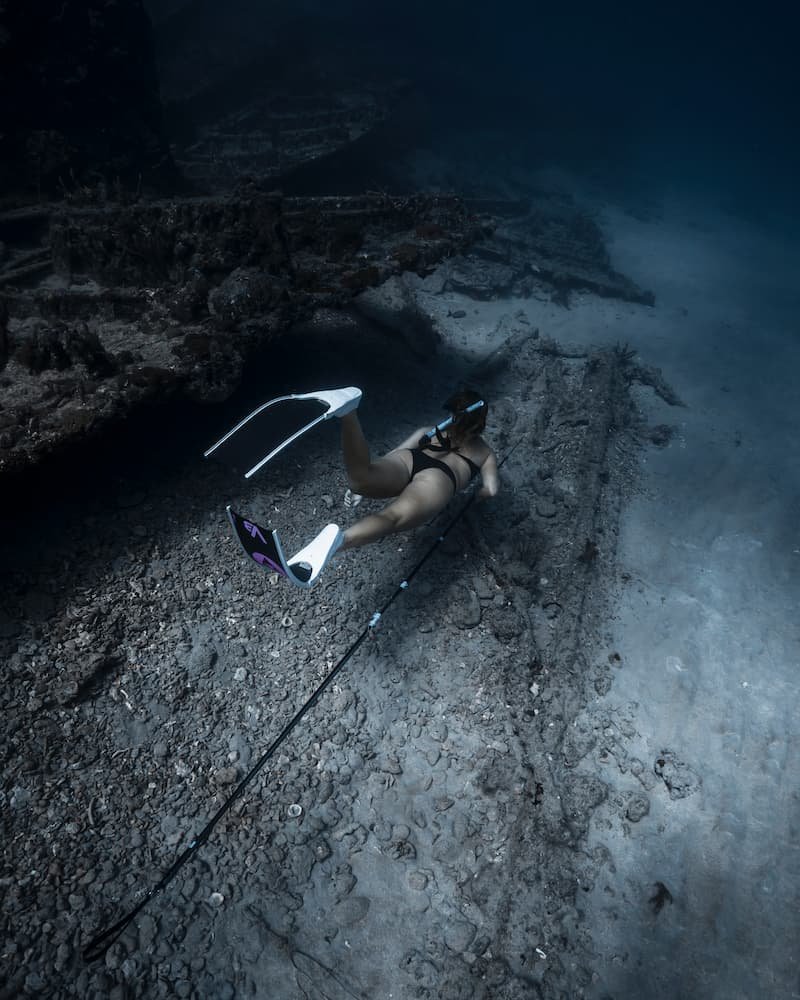
Cultivating intrinsic motivation is a fundamental aspect of nurturing determination in freediving. It involves encouraging freedivers to establish a deep personal connection between their sport and their core values and aspirations. Rather than fixating solely on the outcome, the emphasis is placed on the profound enjoyment and satisfaction derived from the ongoing process of self-improvement. Achieving this intrinsic motivation involves several key elements, including open and honest communication with coaches and mentors about motivations and goals. By gaining a profound understanding of what genuinely drives each freediver, tailored training approaches can be designed, fostering a stronger sense of determination. Furthermore, providing freedivers with autonomy in shaping their training routines, dive plans, and goal-setting processes enhances their sense of ownership and bolsters their determination. Emphasizing the intrinsic rewards of freediving, such as the sheer joy of exploring underwater realms, the profound serenity experienced during breath-holding, and the personal growth that results from conquering fears and challenges, further reinforces determination. When freedivers derive immense pleasure from these intrinsic aspects of the sport, their determination becomes an unwavering force propelling them toward their goals.
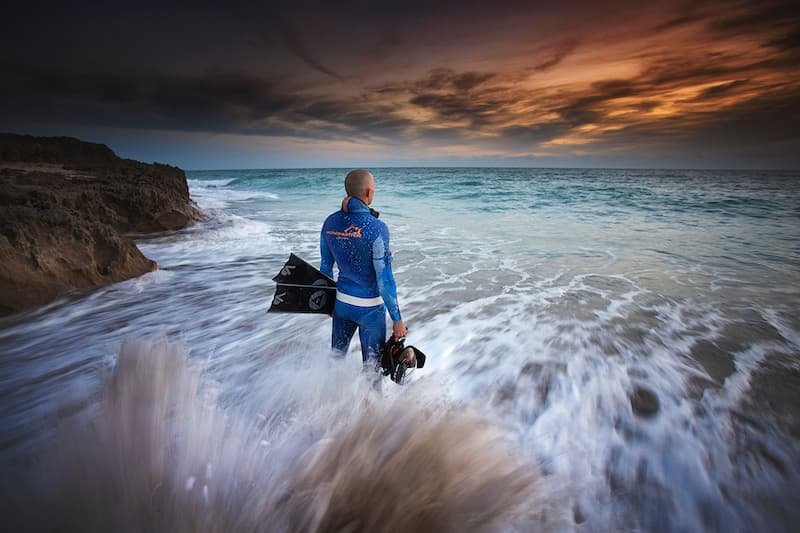
In the pursuit of nurturing determination in freediving, assisting freedivers in establishing SMART goals (Specific, Measurable, Achievable, Relevant, and Time-bound) that align with their long-term aspirations is pivotal. Regularly reviewing progress and making necessary adjustments to these goals is essential for maintaining and strengthening determination. Leveraging technology, such as depth sensors and freediving performance analytics, provides a valuable means of obtaining objective feedback and enhancing self-awareness.
To set SMART goals effectively, it is crucial to ensure that freedivers understand the process. Encouraging them to break down larger objectives into smaller, manageable steps is an effective strategy. For example, a freediver aiming to increase their constant weight depth may establish intermediate goals focused on gradual improvements in equalization techniques.
Moreover, utilizing technology to track and analyze freediving performance metrics, including data from depth sensors, dive computers, and underwater cameras, offers invaluable insights. Reviewing this data not only helps freedivers and coaches identify specific areas for improvement but also enables the monitoring of progress toward set goals.
Lastly, conducting periodic assessments of freedivers' performance and goal attainment is integral. Regular freediving evaluations serve as opportunities to acknowledge successes and make any necessary adjustments to the established goals. This ongoing feedback loop not only reinforces determination but also maintains a sharp focus on the path to achievement.
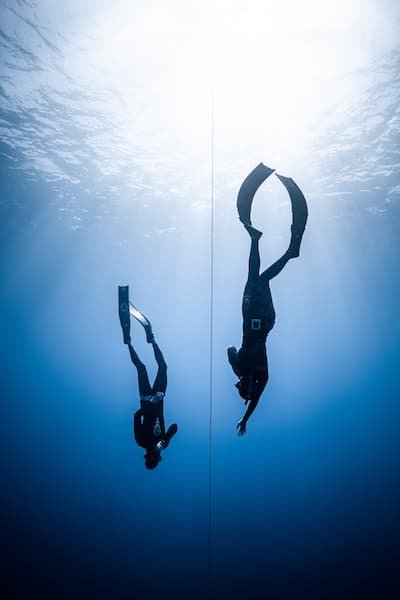
Determination often relies on resilience when faced with setbacks. In the context of freediving, it is essential to encourage freedivers to perceive challenges and failures as valuable learning opportunities rather than indications of inadequacy. To build mental toughness and the ability to bounce back from adversity, it is crucial to implement specific strategies. These include cognitive reframing, positive self-talk, and mindfulness techniques, as advocated by Seligman (2011).
Cognitive reframing entails teaching freedivers to transform negative thoughts and setbacks into positive perspectives. Instead of dwelling on a failed dive attempt, they can shift their focus to the opportunity to refine their technique and strategy. This change in mindset fosters determination by highlighting the potential for growth and learning.
Positive self-talk is another effective approach. Encouraging freedivers to maintain a positive internal dialogue with self-affirming statements such as "I can overcome this challenge" or "I've learned from my mistakes before" can significantly boost confidence and determination, particularly during challenging freediving situations.
Furthermore, introducing mindfulness and visualization exercises into freediving training routines can enhance mental resilience. These techniques assist freedivers in staying present in the moment, even in high-pressure underwater environments. Visualizing successful dives and mentally rehearsing equalization or relaxation techniques can provide a significant boost to determination, helping freedivers tackle challenges with greater confidence and resolve.
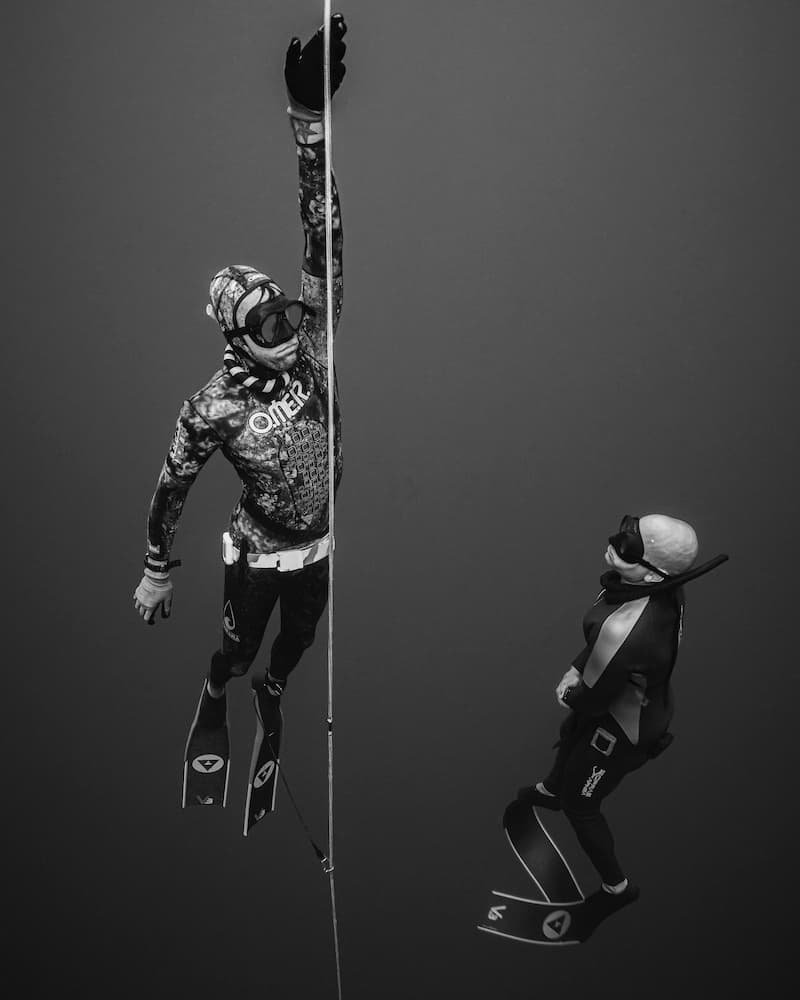
Creating a positive and supportive freediving community plays a pivotal role in reinforcing determination among its members. This involves actively promoting camaraderie, mutual respect, and instilling a growth mindset within the freediving community. The concept of a growth mindset encourages freedivers to view challenges as opportunities for personal growth rather than threats to their abilities, fostering a culture of continuous learning, practice, and perseverance.
In addition to promoting a growth mindset, constructive feedback from coaches and experienced freedivers is invaluable. By providing specific and constructive feedback, highlighting areas for improvement, and acknowledging progress, freedivers remain motivated and determined to enhance their skills, fostering a sense of purpose within the community.
Recognizing the emotional aspect of freediving is equally vital. Freedivers may encounter stress, anxiety, or apprehension, especially during deep or challenging dives. Therefore, it is essential to provide a safe and supportive environment where freedivers can openly express their feelings and seek emotional support from their fellow freedivers and mentors. By nurturing a positive and empathetic freediving community, determination is strengthened, ultimately enhancing the freedivers' overall experience and performance.
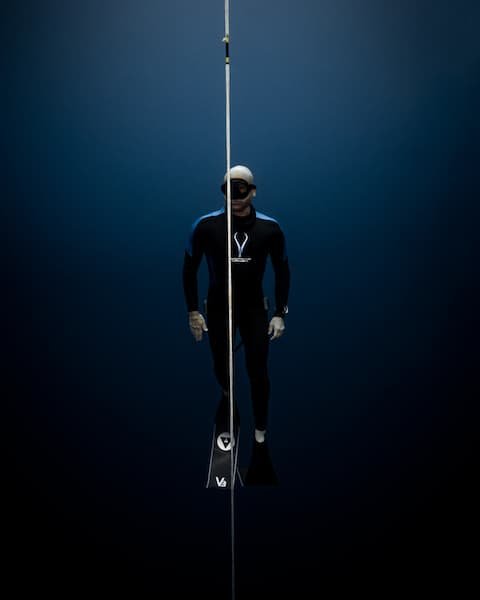
To safeguard against overtraining and burnout in freediving, the implementation of a well-structured training plan with designated periods of rest and recovery is paramount. This holistic approach recognizes that adequate sleep, proper nutrition, and effective stress management are fundamental components for maintaining determination and overall freediving performance, as highlighted by Halson in 2014.
Central to this strategy is the concept of training periodization, which involves developing a comprehensive freediving training plan encompassing phases of varying intensities and focuses. Periodization serves the purpose of enabling freedivers to peak at the right times while effectively preventing physical and mental fatigue. Coaches collaborate with freedivers to create well-balanced training schedules that incorporate depth progression, technique refinement, and adherence to safety protocols.
Additionally, the significance of rest and recovery should be emphasized as integral elements within freediving training. Freedivers must grasp that progress and determination are not solely contingent upon constant training but are equally dependent on allowing their bodies and minds sufficient time to rejuvenate.
Furthermore, nutrition and hydration are of paramount importance. Educating freedivers about proper nutrition ensures they have the requisite energy and nutrients necessary for optimal freediving performance. Staying well-hydrated is particularly crucial for maintaining mental clarity and determination, especially when preparing for deep dives.
Finally, stress management techniques, such as relaxation exercises and focused breathing, should be imparted to freedivers. These practices equip them with the means to remain composed and focused in high-pressure freediving situations. Effectively managing stress is instrumental in sustaining determination during challenging dives, ultimately contributing to their success and overall freediving journey.
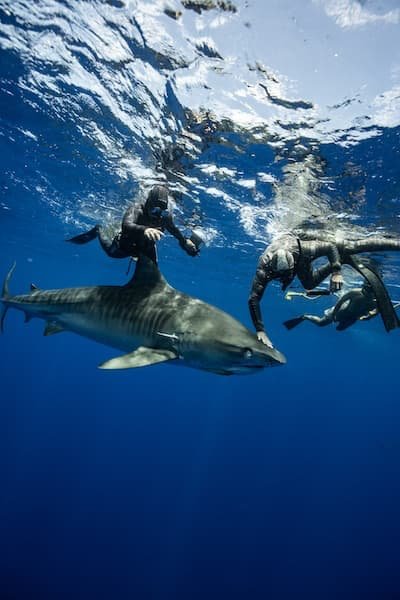
Determination is a multifaceted quality that plays a pivotal role in freediving success. It is influenced by neurobiology, psychology, and various external factors. By understanding the science behind determination and implementing effective strategies, freedivers and coaches can nurture this essential trait. Cultivating intrinsic motivation, setting meaningful goals, building resilience, creating a supportive freediving community, and prioritizing rest are all critical elements in fostering determination. With the right approach, freedivers can harness their determination to achieve their full potential and reach new depths in their freediving endeavors.
In conclusion, determination is not a static trait but a dynamic quality that can be cultivated and strengthened over time in the context of freediving. Coaches, freedivers, and support systems must work together to create an environment that fosters determination through intrinsic motivation, effective goal setting, resilience-building, positive freediving community culture, and holistic well-being. By embracing these strategies and understanding the science behind determination in freediving, individuals can unlock their full potential in the underwater world.